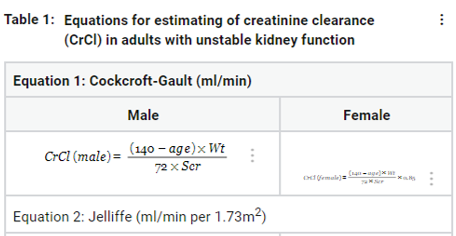Abstract
It is an essential requirement to estimate glomerular filtration rate in dosing adjustment of drug treatment for critically ill patients with unstable kidney function. Previous studies showed that Cockcroft-Gault equation was not appropriate for the assessment of unstable kidney function. However, there is a lack of assessment on other equations specifically designed for fluctuating kidney functions. This study is aimed to evaluate the differences between estimated creatinine clearances by using Cockcroft-Gault, Jelliffe, Brater, and Chiou equations and the impact on dosing adjustment of renally excreted drugs for critically ill patients with unstable kidney function. A retrospective observational study was conducted among 103 patients with unstable kidney function who were admitted to intensive care unit of Taiping Hospital, Malaysia. Serum creatinine levels from day 1 to 7 of admission were collected. The median differences of estimated creatinine clearance based on the four different equations were analysed by Friedman-ANOVA test. The median estimated creatinine clearances when patients were having fluctuating kidney functions showed 35.69 ml/min (IQR: 22.57 – 53.97) by Cockcroft-Gault and 22.64 ml/min (IQR: 10.46 – 38.49) by Jelliffe equation, while Brater and Chiou equations showed 35.88 ml/min (IQR: 19.46 – 56.04) and 30.10 ml/min (IQR: 16.55 – 46.82) respectively. Jelliffe and Chiou equation showed a significant 36.56% and 15.66% lower estimated creatinine clearance respectively as compared to Cockcroft-Gault (p < 0.001). Jelliffe equation demonstrated the lowest estimated creatinine clearance value with a more intense dosage adjustment required for patients’ drug regimen involving renally excreted drugs. In conclusion, there were clinically significant variations in the estimated creatinine clearance from the different equations.
Full text article
Authors

This work is licensed under a Creative Commons Attribution-NonCommercial-NoDerivatives 4.0 International License.

